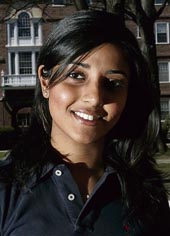 |
| Kaavya Viswanathan |
Boston, Oct. 9 (Reuters): Even the most efficient student would have agonised over the assignment — a 30-page term paper on the social value of literary criticism.
But Richard finished it in one evening, cutting and pasting paragraphs off the Internet for an online company that sells papers to desperate US college students.
The student who ordered the 30-page paper complained that the work wasn’t original. “I almost got fired for plagiarism, which I thought was pretty funny,” Richard said. “Any student who goes onto any of these websites is buying a plagiarised paper.”
Richard, who asked that his last name be withheld, produced term papers for an online company while in graduate school, but has since quit that line of work and is now a teacher.
The Internet has given students access to reams of information, made it cheaper to keep in touch with faraway friends and family and even allowed students to attend universities remotely. But it has also given a new lease on life to an old plague of academia — the term-paper mill.
The web is home to dozens of sites like the one Richard worked for, that sell term papers for about $15 a page.
Some 37 per cent of undergraduates admit to copying portions of their research papers from the web, up from 10 per cent in 1999, accor- ding to a 2006 poll of 60,000 US college students.
Students value originality, but when faced with deadline pressure and tight schedules, see copying material off the web — even if just a few paragraphs, rather than an entire paper — as an easy shortcut.
The temptation to cut corners runs deep in modern American culture — from professional athletes who use steroids or other illegal substances to quickly improve their performance, to corporations that back-date stock options to give their executives a quick pay-off, to members of Congress who steer contracts to deep-pocketed donors in hopes of help at the next election.
Perhaps one of the most apt comparisons is this spring’s move by publisher Little, Brown & Co. to recall the novel How Opal Mehta Got Kissed, Got Wild, and Got a Life after news reports showed that lengthy sections of the book by author and Harvard University undergraduate Kaavya Viswanathan appeared to imitate other novels.
Viswanathan has said the similarities were accidental.










